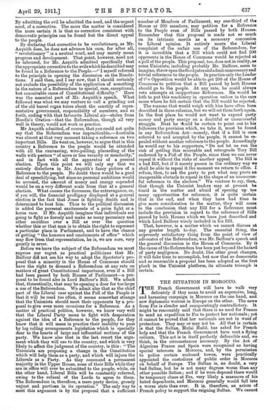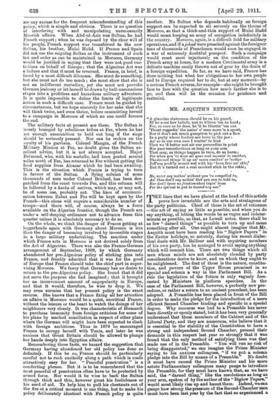THE SITUATION IN MOROCCO.
THE French Government will have to walk very delicately if they mean to avoid an expensive, long, and harassing campaign in Morocco on the one hand, and new diplomatic worries in Europe on the other. The news from Fez is slender and exasperatingly contradictory. It might be reasonably said that there is no need for France to send an expedition to Fez to protect her nationals ; yet it cannot be proved that her nationals are not in want of protection. They may or may not be. All that is certain is that the Sultan, Mulai Hafid, has asked for French help and that the French Government have sent a flying column. This act is in itself perfectly defensible and, we think, in the circumstances necessary. By the Act of Algeciras France and Spain were recognized as having special interests in Morocco, and, by the permission to police certain seaboard towns, were practically appointed the custodians of public order in Morocco on behalf of Europe. The Sultan is, no doubt, a very bad Sultan, but he is not many degrees worse than any other possible Sultan; and if he were deposed there would be temporary chaos at Fez, very likely a massacre of his hated dependents, and Morocco generally would fall into a worse state than ever. It is, therefore, an axiom of French policy to support the reigning Sultan. We cannot see any excuse for the frequent misunderstanding of this policy, which is simple and obvious. There is no question of interfering with and manipulating unnecessarily Moorish affairs. When Abd-ul-Aziz was Sultan, he had French support ; when he was deposed by the clear will of his people, French support was transferred to the new Sultan, his brother, Mulai Hafid. If France and Spain did not use the reigning Sultan as the instrument of such law and order as can be maintained in Morocco, Germany would be justified in saying that they were not good cus- todians on behalf of Europe ; that the Algeciras Act was a failure and that it must be reversed. France, in brief, is faced by a most difficult dilemma. She must do something, but she must not do too much ; she must show that she is not an indifferent custodian, yet she must not provoke German jealousy or let herself be drawn by half-unconscious stages into a profitless and hazardous military adventure. It is quite impossible to define the limits of legitimate action in such a difficult case. France must be guided by circumstances, but we hope sincerely for her sake that she will think twice, and even thrice, before committing herself to a campaign in Morocco of which no one could foresee the end.
The military facts at present are these. The Sultan is loosely besieged by rebellious tribes at Fez, where he has not enough ammunition to hold out long if the siege should be seriously pressed. Nor can he reckon on the loyalty of his garrison. Colonel Mangin, of the French Military Mission at Fez, no doubt gives the Sultan ex- cellent advice, but it is not always accepted. Major Bremond, who, with his mahalla, had been posted several miles north of Fez, has returned to Fez without getting the food supplies from Alcazar which he had been awaiting. This is the situation which France is trying to turn in favour of the Sultan. A flying column of some thousands of men under Colonel Brulard, has been des- patched from the coast towards Fez, and this column will be followed by a harka of natives, which may, or may not, be of some use, probably not. The lines of communi- cation between Rabat and Fez will be kept open by the French—this alone will require a considerable number of troops—and there will, of course, always be a, force available on the Algerian frontier, though the French are under a self-denying ordinance not to advance from this quarter unless it-is absolutely necessary to do so.
On the whole, we think the danger of France getting at loggerheads again with Germany about Morocco is less than the danger of becoming involved by insensible stages in a large military undertaking. The sanction under which France acts in Morocco is not derived solely from the Act of Algeciras. There was also the Franco-German arrangement of September, 1909, by which Germany abandoned her pre-Algeciras policy of sticking pins into France, and frankly admitted that it was for the good of Europe that France should take the chief part in super- vising Morocco. We fancy that Germany has no desire to return to the pre-Algeciras policy. She found that it did not serve the purpose she had imagined ; that it brought her an inconvenient amount of unpopularity in Europe, and that it would, therefore, be wise to drop it. We may even surmise that her present policy is the exact reverse. She knows that a France fixing all her attention on affairs in Morocco would be a quiet, uncritical France, without the leisure or the heart to watch the doings of her neighbours very closely. It was characteristic of Bismarck to purchase immunity from foreign criticism for some of his plans by marked conciliation in respect of other plans where the German will might have been expected to clash with foreign ambitions. Thus in 1878 he encouraged France to occupy herself with Tunis, and later he was anxious that Great Britain should be allowed to plunge her hands deeply into Egyptian affairs.
Remembering those facts, we hazard the suggestion that Germany having abandoned her old policy has done so definitely. If this be so, France should be particularly careful not to rush excitedly along a path which is made attractively easy for her. " Peaceful penetration " is a comforting phrase. But it is to be remembered that the most peaceful of penetrators often have to be protected by armed force. Nor would it be wise to back the Sultan through thick and thin, however great his foolishness or his need of aid. To help him to pull his chestnuts out of the fire at a critical moment is one thing, but to make his policy deliberately identical with French policy is quite another. No Sultan who depends habitually on foreign support can be expected to sit securely on the throne of Morocco, so that a thick-and-thin support of Mulai Hafid would mean keeping an army of occupation indefinitely in the country. Morocco, again, is a difficult field for military operations, and if a jeluul were preached against the foreigner tens of thousands of Frenchmen would soon be engaged in a war of extremely doubtful prospect. Such a campaign would react most injuriously on the condition of the French army at home, for a modern Continental army is a delicate machine easily thrown out of gear by the drain of a foreign expedition. So far, as we have said, France has done nothing but what her obligations to her own people and to Europe required her to do, but at any moment—by a serious French reverse, for example—she might be brought face to face with the question how much farther she is to go, and then will be the occasion for prudence and restraint.



























































 Previous page
Previous page